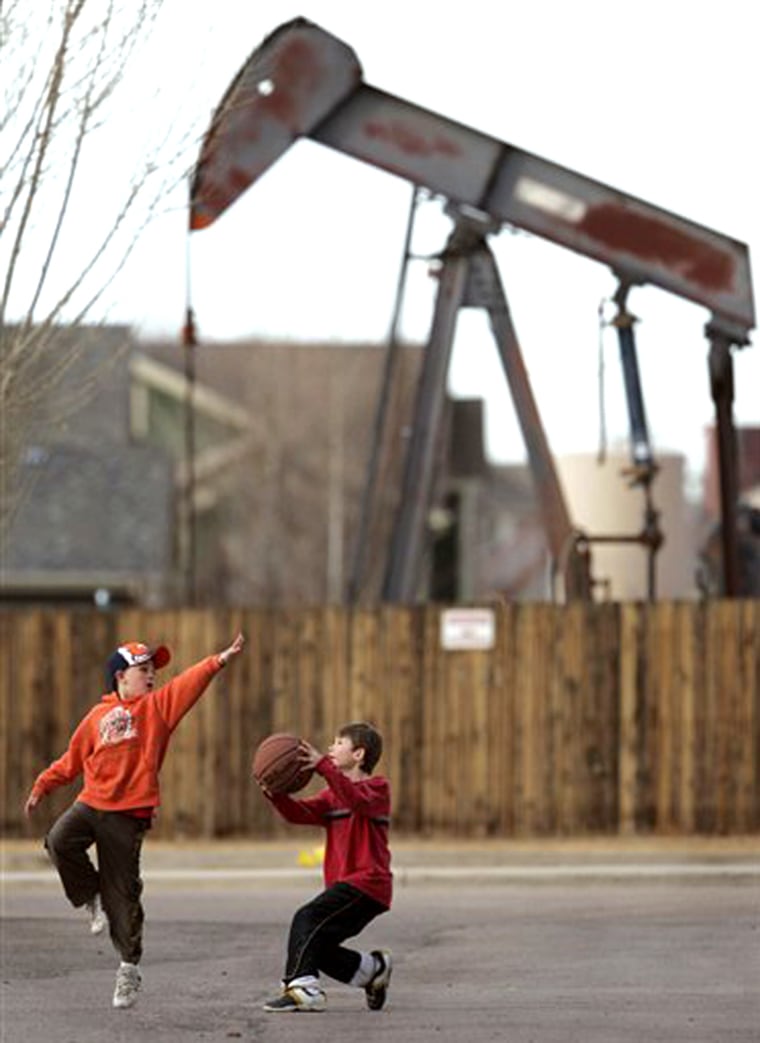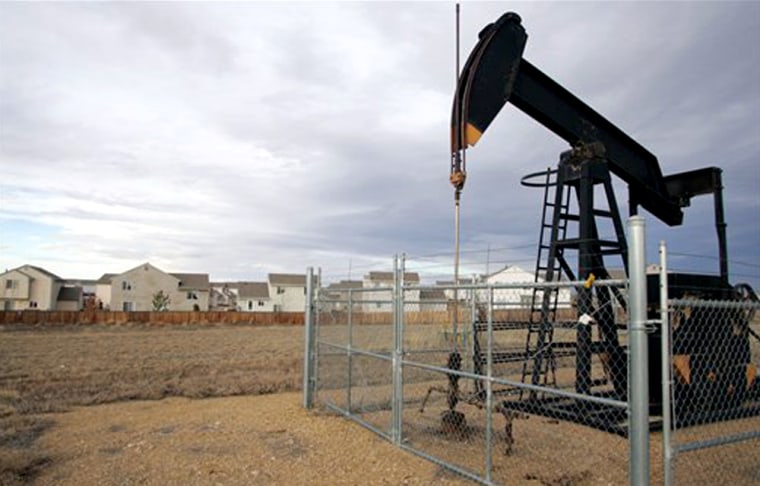Ask cattle ranchers Dan and Cheryl Johnson how much money they make an hour and they will tell you it’s a pittance. Ask them to put a value on their life along winding Piceance Creek in western Colorado and they answer simply — priceless.
These days, the Johnsons are worried their operation will end up worthless. Energy companies hunting for natural gas are snapping up land all around them, either through old oil shale claims or through federal auctions. Some now have claims on minerals under the same land the Johnsons lease for grazing their cattle in the pasture-dotted hills northwest of Rifle. Roads are being built and plans are in the works for new wells.
Dan Johnson fears that if the companies drill in the narrow gulches around his property — the conduits for moving cattle from pasture to pasture — he’ll lose precious grazing land and be out of business. He and his wife, both in their late 40s, can feel their dream of passing their business to their two daughters slipping away.
“Cattle prices are way below the rest of the economy,” Johnson said. “Equipment prices keep going higher, the fuel prices keeping going higher.
“And now we have this other burden tacked on top of it,” he said.
Growth conflicts
The energy boom that has dominated much of the Rocky Mountain West for the past several years has been a mixed blessing. It has brought millions to tiny counties happy to have the money, but the rapid development has become a top concern for retirees, those in a fledgling tourism-based economy and professionals whose relocations to once-quiet towns have helped make the West one of the nation’s fastest-growing regions.
“That growth has not been built around growth in the natural resource industry,” said Thomas Power, professor and head of the University of Montana’s economics department. He said Westerners need to weigh what they’re willing to sacrifice for “a very temporary expansion in the economy.”

Mineral development — oil and gas, coal, gold, silver and uranium mining — for decades has provided the West with high-paying jobs and great infusions of wealth. It’s also been followed by busts that states have worked hard to offset by diversifying their economies. Hunters and anglers — worried that drilling, truck traffic and erosion from well sites are already harming antelope, deer and other animals — are teaming up with environmentalists to lobby for habitat protection.
They are among many residents who say natural resources — their beauty and their preservation — now play a huge role in the region’s economic health.
“The gold in them thar hills is coming in the pockets of people retiring here for the quality of life,” said Dave Kearsley, an investment adviser and attorney who moved from Massachusetts to Grand Junction for that very thing.
Mayor’s perspective
Not everyone sees it that way.
Monty Newman, the mayor of Hobbs, N.M., called oil and gas “our major lifeblood.” His town in southeastern New Mexico is a thriving service center for the industry.
Energy development can coexist with protecting the environment and the so-called rural way of life, he said.
“I know it takes a lot of natural resources in order to make this country run and provide incomes so people can retire,” Newman said.
The surging development of the Rockies’ vast natural gas reserves, stoked by high prices and the push for more domestic production, is filling cash registers at motels, stores and restaurants throughout the region. Wyoming and New Mexico have piled up hundreds of millions of dollars in surplus, thanks to taxes from oil and gas development.
Western Colorado’s Garfield County, site of one of the country’s busiest offices for federal oil and gas permits, said a full 17 percent of all revenues — nearly $8.5 million — came from oil and gas production last year.
There’s plenty more where that came from, industry officials say. While production is declining in older fields including the Gulf Coast, they say the Rockies promise many years of reliable gas and companies are investing in the pipelines and processing plants. EnCana Oil and Gas USA is building a gas processing plant in western Colorado that will be able to process 650 million cubic feet of gas daily.
“I don’t see a bust in this decade and probably the next two decades,” said Joe Jaggers, vice president of exploration and production in the Denver office of Oklahoma-based Williams Cos., one of the largest producers in the region.
Williams recently received approval to boost the number of wells it can drill in a 20,000-acre section of western Colorado, including the gas-rich Piceance Basin.
More wells, air pollution
In the middle of the gas rush are people like Beverly and Sam Sharp, who live in Pinedale, Wyo. The retired Southern California school teachers were lured there six years ago by the small-town atmosphere, nearby fishing streams and breathtaking views of the Wind River mountain range from their blufftop house.
Pinedale has changed. The Bureau of Land Management is considering a plan that would allow energy companies to drill 3,100 wells in the Jonah gas field a short drive outside town — a project expected to produce nearly 8 trillion cubic feet of gas, enough to heat 96 million homes for a year and generate approximately $6.1 billion in royalties for the state and federal governments.
The project, however, is also expected to boost air pollution in the area not far from wilderness and both Yellowstone and Grand Teton national parks. The BLM also said the project would affect antelope in the area, even though energy companies have pledged millions for mitigation work.
The average cost of an apartment in Pinedale has skyrocketed nearly 81 percent since 1998, with the average monthly cost reaching $699 last year, according to Sublette County figures. The Sharps already see more haze in the air around them.
“It’s not to the point for me that I’m going to say I’m going to move somewhere else, because we love it here,” said Sam Sharp, a Wyoming native. But he said he can understand why others might think twice.
Technology response
Industry officials say they are striving to minimize the impact of development through new technology including smaller drilling rigs, quieter equipment, buildings designed to blend with the surroundings and techniques that reduce surface disturbance.
Canadian-based EnCana Corp., one of North America’s largest independent oil and gas companies, is studying how drilling might affect wildlife on a 45,000-acre ranch it owns in western Colorado. The site is home to deer, elk and raptors including peregrine falcons and golden eagles. The work includes speedier reclamation of well sites, cutting-edge drilling techniques and piping water to reduce the need for truck traffic.
Ashley Korenblat, owner of Western Spirit Cycling in the outdoors hotspot of Moab, Utah, remains wary of the pace and location of gas drilling.
“People are not going to pay me $1,000 to go biking around a bunch of wells,” said Korenblat, who has 30 employees. “We’re not making any more wilderness. We know we’re going to run out of oil and gas, so do we really need to shred every nook and cranny of backcountry to find the very last drop?”
